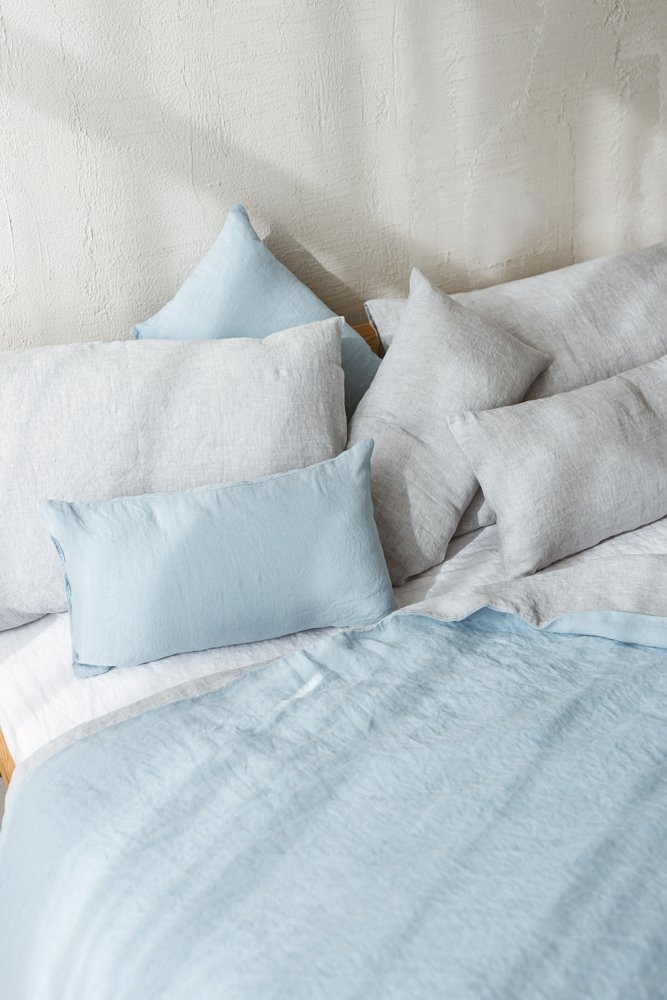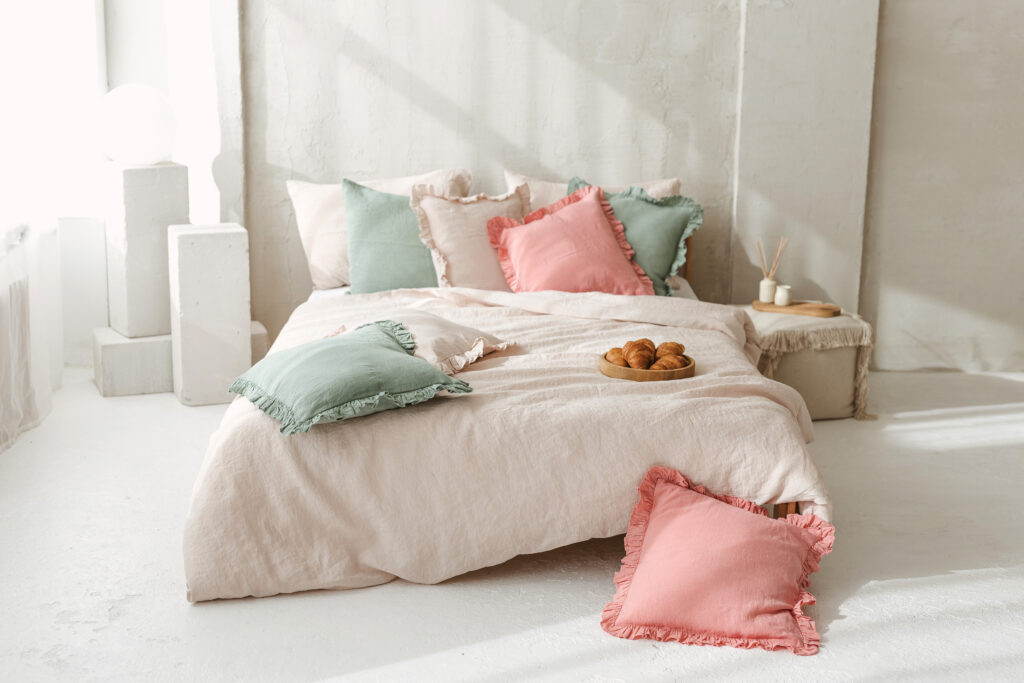Are you torn between the softness of cotton and the durability of linen sheets for your bed? Choosing the right bedding can significantly impact your sleep quality and overall comfort.
Let’s delve into the differences between cotton and linen sheets, helping you make an informed decision.
Cotton sheets offer a wide range of design options to match your bedroom decor and are initially more budget-friendly.
On the other hand, linen sheets, made from the flax plant, are highly durable, moisture-wicking, and hypoallergenic. Although they may feel rough initially, they soften over time, providing a luxurious and cozy sleeping experience. Plus, linen sheets are considered more eco-friendly.
By understanding the unique qualities of cotton and linen sheets, you can choose the perfect bedding option for your needs and preferences.
Key Takeaways
- Linen sheets are more durable and long-lasting compared to cotton sheets.
- Linen sheets are more moisture-wicking and breathable than cotton sheets.
- Linen sheets are hypoallergenic and repel allergens.
- Cotton sheets offer more design options and are more affordable.
Durability of Linen Sheets
Linen sheets are highly durable and can last decades if they’re well-maintained. With the proper care, linen sheets can outlast other bedding options. The durability of linen sheets is one of their most notable qualities.
Moisture-Wicking Properties of Linen Sheets
Linen sheets are highly regarded for their ability to wick away moisture, making them an excellent choice for hot sleepers and those who tend to get warm at night. The natural moisture-wicking abilities of linen allow for better breathability compared to cotton sheets.
It means moisture is quickly absorbed and evaporated, keeping you cool and dry overnight. Linen sheets are especially suitable for warmer climates and individuals who prefer more relaxed bedding.
Hypoallergenic Nature of Linen Sheets
Linen sheets are specially designed to be hypoallergenic. They are an excellent choice for individuals with allergies or sensitivities.
Unlike cotton sheets, linen is lint-free and naturally repels dust mites, mold, and mildew. So you can sleep comfortably without worrying about allergens causing discomfort or flare-ups. The hypoallergenic nature of linen sheets makes them suitable for sensitive skin, as they’re less likely to cause irritation or rashes.
Environmental Benefits of Linen Sheets
Linen sheets offer environmental benefits, making them a popular option for those seeking to reduce their carbon footprint.
The production of linen sheets requires no irrigation, and linen is grown with minimal chemical usage. Linen sheets are highly durable, lasting for decades, and reducing waste.
Design Options Available With Cotton Sheets
When choosing cotton sheets, you have many design options to suit your preferences and style. Cotton sheets come in various colors, patterns, and textures, allowing you to find the perfect fit for your bedroom decor.
Whether you prefer a crisp percale weave or a smooth sateen weave, cotton sheets provide diverse options for you to choose from. Cotton sheets can be found in different bedding fabrics such as percale, sateen, and brushed cotton, further expanding your range of design choices.
Affordability of Cotton Sheets
Cotton sheets offer a budget-friendly option for bedding. Cotton sheets are more affordable than linen sheets, making them a cost-effective choice for those on a budget.
Cotton sheets are a great choice to balance affordability and comfort. They offer a softer feel at a more budget-friendly price.
Softening of Linen Sheets Over Time
As you continue to use and launder your linen sheets, you’ll notice a transformation in their texture. With each use and wash, your linen sheets will continue to soften, ensuring you can enjoy their inviting and comfortable feel for years.
The breathability of Cotton Vs Linen Sheets
Consider linen sheets for a cooler and more comfortable sleep experience to maximize breathability.
Linen sheets are highly breathable. This feature makes them ideal for hot sleepers or those living in warmer climates. Their natural fibers allow air to circulate freely, preventing heat and moisture buildup.
Cotton sheets offer some breathability but are less effective than linen. While cotton sheets may provide a softer feel, linen sheets excel in their ability to wick away moisture and promote airflow.
Warmth Provided by Cotton Vs Linen Sheets
Cotton sheets initially make you feel warmer but can cause overheating in warmer temperatures.
Linen sheets are better at keeping you more relaxed due to their breathability. They retain body heat and provide a cozy feeling, making them ideal for individuals who get warm during sleep.
When choosing between cotton and linen sheets, consider your warmth preferences. Linen sheets may be the better option if you get hot during sleep or live in a warmer climate; however, cotton sheets might be the way to go if you prefer a softer and more inviting feel.
Suitability of Linen for Bedding
Linen sheets have several qualities that make them highly suitable for bedding:
- Exceptional durability, lasting for decades
- Moisture-wicking and excellent for hot sleepers
- Hypoallergenic and lint-free for those with allergies
- Environmentally friendly and sustainable
- Natural ability to regulate temperature
Pros of Linen Sheets
Are you looking for the advantages of linen sheets? What makes them stand out? Here are some reasons why linen sheets are an excellent choice for your bedding:
- Durability: Linen sheets are highly durable and can last decades with proper care. They’re resistant to pilling and tearing, making them a long-lasting investment.
- Moisture-wicking: Linen sheets have excellent moisture-wicking properties, which can help keep you cool and dry throughout the night. It makes them ideal for hot sleepers or those living in humid climates.
- Hypoallergenic: Linen sheets are a great option for allergies or sensitive skin. They’re naturally hypoallergenic and lint-free, reducing the risk of irritation and allergic reactions.
Environmentally friendly: Linen sheets are considered more environmentally friendly than cotton sheets. The flax plant used to make linen requires no irrigation, and all plant parts are used, minimizing waste. Choosing linen sheets can be a sustainable choice for your bedding needs.
Cons of Linen Sheets
Linen sheets tend to wrinkle more quickly than cotton due to their textured fibers. This may require more time to iron out wrinkles. Some people embrace wrinkled linen sheets’ natural, relaxed look, while others prefer a neat, crisp bed.
Pros of Cotton Sheets
If Cotton sheets are an excellent choice for a smoother and more wrinkle-free bed, here are some pros of cotton sheets to consider:
- Breathability: Cotton sheets offer excellent breathability, allowing air to circulate and keeping you cool and dry throughout the night.
- Softness: Cotton sheets are known for their softness, providing a more inviting and comfortable feel than other materials.
- Design options: With cotton sheets, you have various design options. Whether you prefer vibrant colors, subtle patterns, or textured finishes, there’s a cotton sheet that suits your style.
- Durability: Cotton sheets are made with complex woven structures that make them durable and long-lasting. They can withstand regular washing and maintain their quality over time.
Cons of Cotton Sheets
- It may cause overheating and discomfort
- More prone to wrinkling
- It may have a shorter lifespan than linen.
- Initial investment may be higher.
Considerations When Choosing Between Linen and Cotton Sheets
Key considerations:
When choosing between linen and cotton sheets, it’s essential to consider your personal preferences and sleep needs. Here are some key considerations to remember when deciding between cotton and linen sheets:
- Temperature Regulation: Linen sheets are highly breathable and moisture-wicking, making them a better option for hot sleepers. On the other hand, cotton sheets provide a softer feel and may be more suitable for those who prefer a cozy and inviting sleep environment.
- Design Options: Cotton sheets offer a more comprehensive range of colors and patterns, allowing you to find the perfect style to match your bedroom decor. Linen sheets, while more limited in design options, have a timeless and natural aesthetic that can add a touch of elegance to your bed.
- Durability: Linen sheets are known for their durability and can withstand frequent washing and use. Cotton sheets, although not as durable as linen, can still provide excellent longevity with proper care.
- Environmental Impact: Linen sheets are more sustainable and environmentally friendly than cotton sheets. Linen is made from the flax plant, which requires less water and fewer pesticides to grow, making it a greener choice.
Consider these factors when deciding between cotton and linen sheets to ensure a comfortable and satisfying sleep experience.
Conclusion
When choosing between cotton and linen sheets, consider your preferences, sleep needs, and the unique qualities of each material. Cotton offers softness, versatility, and affordability, while linen excels in durability, breathability, and eco-friendliness. By weighing the pros and cons of each type of sheet, you can make an informed decision to enhance your sleep comfort.






